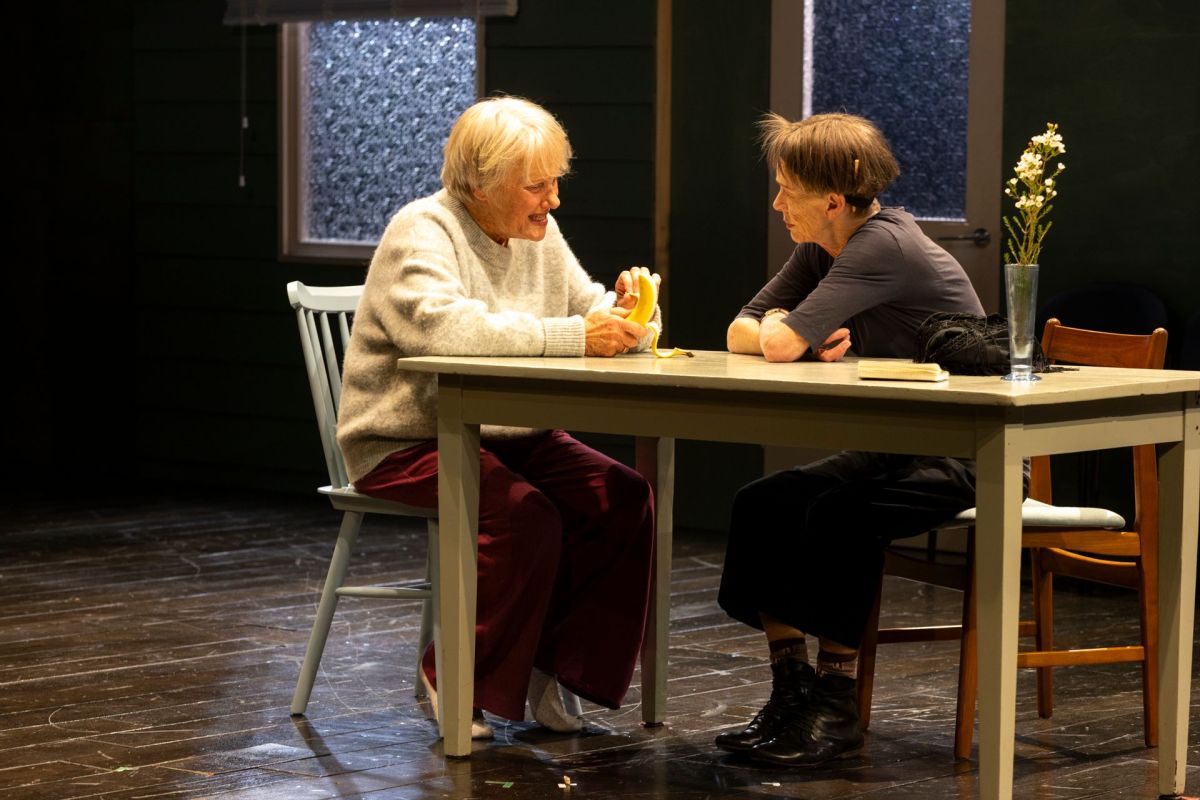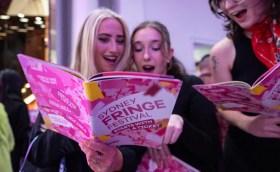Judy Davis, our living legend of stage and screen, compassionately and fiercely inhabits the character of author Helen Garner, our living treasure of words and literature. Belvoir St Theatre’s meta production of The Spare Room, based on Garner’s award-winning 2008 novel of the same name, is believed to reflect her personal life experience of caring for a friend with terminal cancer.
Adapted for theatre and tightly directed by Belvoir’s Artistic Director Eamon Flack, with set design by Mel Page and lighting by Paul Jackson, the staging is taut and sparse to mirror the content and tone of the book. Anthea Cottee’s live cello accompaniment is integral. She plucks and bows single, repeated notes, chords, melodies, double-stopping crescendos and a simple duet to emulate and enhance the play’s harmony and discord.
The room of the title is spacious yet dotted with piecemeal furniture and a bulging linen cupboard. It also becomes the office of medical and other practitioners, including Hannah Waterman’s Dr Caplin. The screened and curtained windows suggest natural light and the freedom of Helen/Hel’s normal life as a writer invigorated by the children next door. Nonetheless, she is willing to sacrifice three weeks to minister to her friend Nicola (Elizabeth Alexander).
Nicola has come to Melbourne for cancer treatment at the Theodore Institute, an expensive alternative medicine clinic. Helen is shocked by Nicola’s condition. The sheets in her well-stocked shelves are needed to remake her bed nightly.
Everyone except its patients knows that the institute is a con. Uncomfortable hours are spent in the ‘waiting room’ for a ‘doctor’ who doesn’t bother to attend. The play exposes the carelessness and cruelty of money-making quacks who prey on the desperate. Ludicrously, Nicola holds electrodes over her naked body wrapped inside an ozone sauna. It draws one of many tension-easing laughs from the audience.
Nicola represents the understandable despair of those looking for a cure. She can’t or won’t admit to the gravity of her illness and clings to hope through distraction. She swings between being incapacitated and smiling too brightly. The smile infuriates Helen.
In a change of mood, Helen, Nicola and Iris, her long-suffering niece (a riveting Emma Diaz) watch a magic show. Does the spectacle suggest the clinic’s illusory claims? Alan Dukes shapeshifts from his medical and bartender roles to that of the magician who delivers the prescient line, ‘There are many ways to make a thing disappear’. When Nicola acts as the magician’s assistant her forced smile becomes beatific. She is luminous while in the thrall of the trick. Is this persona her real identity, the woman she should be if not trapped in the unrelenting grip of disease?
The Spare Room is a distilled study of the impact of terminal illness. It is a microcosm of one of life’s worst experiences from the viewpoints of the patient and the carer to show how they both suffer. As always, writer Garner goes where others fear to tread. Hel is in a bind. She bravely shoulders the role of ‘handmaid’ yet is furious. She is angry at the clinic’s opportunistic exploitation and at Nicola’s refusal to acknowledge the truth of her condition and her reliance on family, friends and acquaintances – irrespective of their willingness to help. Above all, she is exhausted by the daily and, worse, nightly grind of providing interminable, kind-hearted but unskilled palliative care.
Read: Theatre review: The Assignment, Clubhouse Theatre, Townsville
Congratulations to all involved. It is vital to commission and perform original Australian theatre, and what better than further immortalising the legacy of Helen Garner and Judy Davis? Like the novel, the play is deliberately spare (perhaps even emotionally detached) to ‘spare’ the audience, particularly those who have experienced serious or incurable disease. While dying can be an unbearable ordeal, as witnessed in The Spare Room, it may sometimes be lightened with moments of humour and joy. However, to fittingly capture the play’s essence and inevitable outcome, Davis pointedly closes with the novel’s final words, ‘It was the end of my watch, and I handed her over.’
The Spare Room
Adapted from the book by Helen Garner
Belvoir St Theatre
Adapter and Director: Eamon Flack
Set and Costume Designer: Mel Page
Lighting Designer: Paul Jackson
Associate Lighting Designer: Phoebe Pilcher
Composer and Sound Designer: Steve Francis
Assistant Director: Mehhma Malhi
Fight Director: Nigel Poulton
Magic and Illusions Design: Adam Mada
Stage Manager: Luke McGettigan
Assistant Stage Manager: Grace Sackman
Cast: Elizabeth Alexander, Judy Davis, Emma Diaz, Alan Dukes, Hannah Waterman
Musician: Anthea Cottee
Tickets: $41-$97
The Spare Room will be performed until 13 July 2025.






